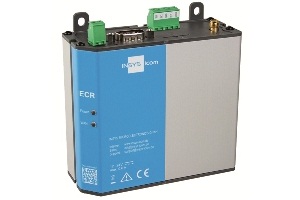Staying connected: Top considerations when purchasing an industrial router

It is universally acknowledged that a plant manager in search of Industry 4.0 functionality requires a router. But it’s also true that you get what you pay for. If you buy a pair of knock off designer sunglasses while on holiday, its performance will no-doubt fall short of the real thing. The same goes for your industrial router.
Here Anna Wels, vice president, Market Unit icom for industrial router manufacturer, Insys, explains the considerations that must be made when looking to digitalise your plant with the installation of an industrial router.
Industry 4.0 has changed the way industrial plants operate forever. The creation of smart factories has enabled cyber-physical systems to communicate and cooperate on a global level, allowing decentralised decisions to be made from anywhere in the world.
For this to happen, plants and the equipment in them need to move away from closed, proprietary communication protocols to more open networks — and having the correct industrial router is vital.
Designed for use in highly demanding environments, professional, industrial routers provide a reliable and secure connection between industrial applications, allowing for several hundred data points, including sensors to transfer data at high speed. This data can be used for a number of applications including remote monitoring, predictive maintenance and even environmental monitoring.
In addition to acquiring the data, Insy’s own range of industrial routers can also process application data, allowing for the conditions of connected devices and related applications to be monitored via edge computing.
Security
When connecting your plant to the world outside, either for networking multiple facilities or to allow employees to access data off-site, security should be a top priority for any plant manager. It is important to ensure that the router you select has the appropriate security systems in place as unsecured systems can have a devastating effect, particularly those that are integral to a country’s critical infrastructure.

Anna Wels
Firewalls, Network Address Translation (NAT) and packet filtering should all come as standard as a way of controlling access to a network based on the IP address. Insys’ own range of routers, including the latest ECR series, integrate OpenVPN, IPsec and Generic Routing Encapsulation (GRE) technologies to ensure further security measures are in place.
Additional port security features in Insys routers, allow for the immediate dispatch of status and fault messages via SNMP, e-mail or even SMS. These messages can include unauthorised login attempts, modification of the system’s configuration or even the disconnection of a device at the switch.
Retrofitting from old to new
When installing a new industrial router, compatibility is key and significant problems can occur if the correct system is not chosen. Very few plants can afford the downtime that comes with overhauling all of their equipment to make way for new, IoT enabled systems, however retrofitting legacy equipment can prove to be a more efficient way to connect.
The range of routers from Insys are suitable for an easy retrofit due to their compatible interfaces; RS232 and RS485. The integrated I/Os also extend the range of applications that it can support.
When looking to install an industrial router, whether its for the first time, or to replace an existing model, it is important that you select a model that meets the often-unique needs of your plant. Working with a supplier such as Insys icom will ensure you not only make the right decision when selecting a router, but also how to make the most of it when starting your plants digitalisation journey.
The author is Anna Wels, vice president, Market Unit icom for industrial router manufacturer, Insys
Comment on this article below or via Twitter @IoTGN
